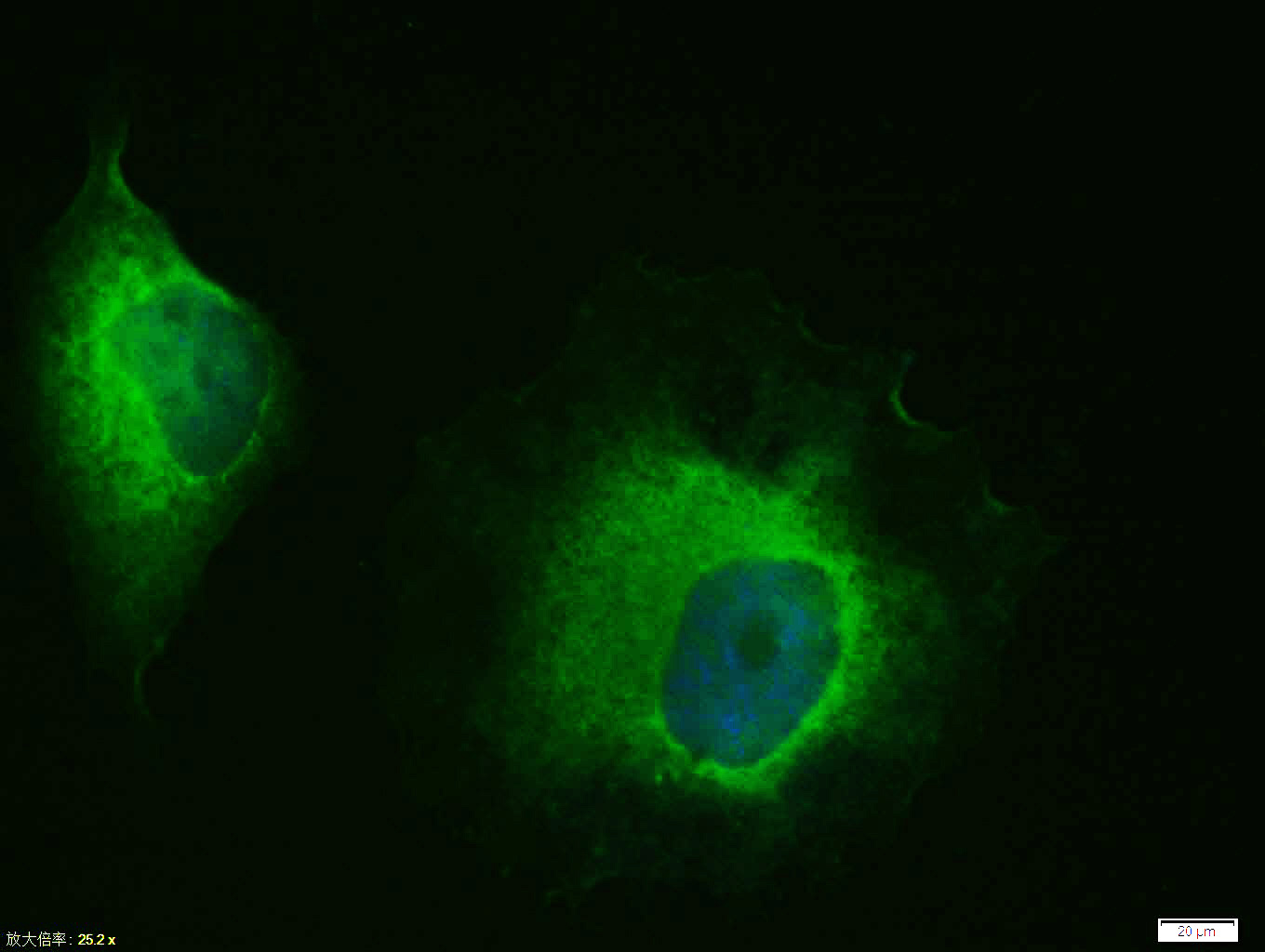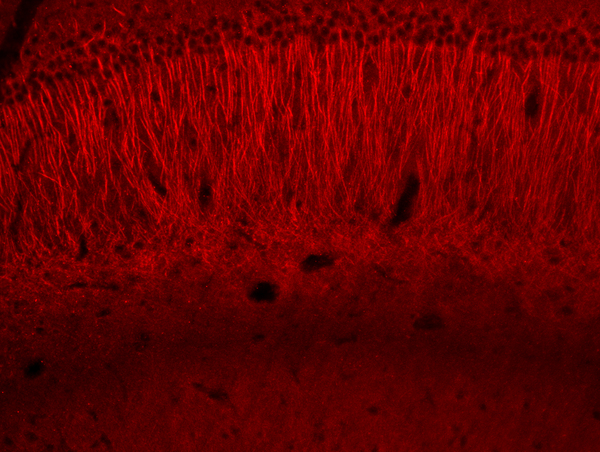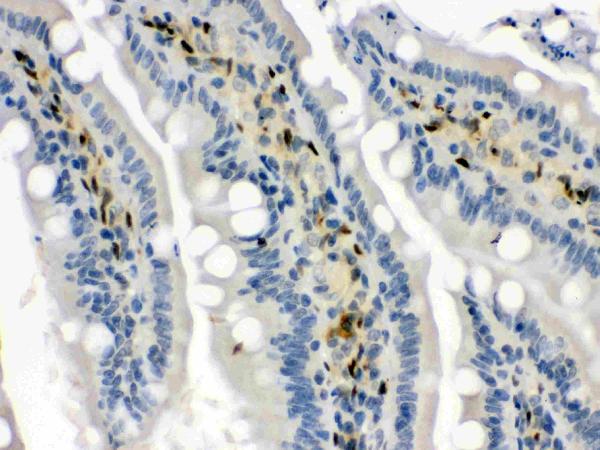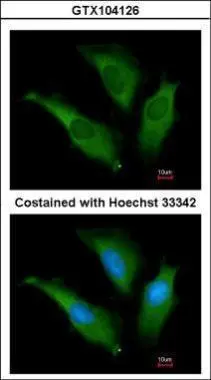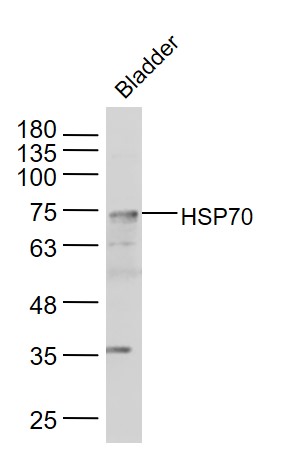
Mouse bladder lysates probed with HSP70 Polyclonal Antibody, Unconjugated (bs-0126R) at 1:300 dilution and 4˚C overnight incubation. Followed by conjugated secondary antibody incubation at 1:10000 for 60 min at 37˚C.
HSP70 Polyclonal Antibody
BS-0126R
ApplicationsFlow Cytometry, ImmunoFluorescence, Western Blot, ELISA, ImmunoCytoChemistry, ImmunoHistoChemistry, ImmunoHistoChemistry Frozen, ImmunoHistoChemistry Paraffin
Product group Antibodies
ReactivityBovine, Chicken, Human, Mouse, Rabbit, Rat, Sheep
TargetHSPA1A
Overview
- SupplierBioss
- Product NameHSP70 Polyclonal Antibody
- Delivery Days Customer16
- ApplicationsFlow Cytometry, ImmunoFluorescence, Western Blot, ELISA, ImmunoCytoChemistry, ImmunoHistoChemistry, ImmunoHistoChemistry Frozen, ImmunoHistoChemistry Paraffin
- Applications SupplierWB(1:300-5000), ELISA(1:500-1000), FCM(1:20-100), IHC-P(1:200-400), IHC-F(1:100-500), IF(IHC-P)(1:50-200), IF(IHC-F)(1:50-200), IF(ICC)(1:50-200)
- CertificationResearch Use Only
- ClonalityPolyclonal
- Concentration1 ug/ul
- ConjugateUnconjugated
- Gene ID3303
- Target nameHSPA1A
- Target descriptionheat shock protein family A (Hsp70) member 1A
- Target synonymsHEL-S-103, HSP70, HSP70-1, HSP70-1A, HSP70-2, HSP70.1, HSP70.2, HSP70I, HSP72, HSPA1, heat shock 70 kDa protein 1A, HSP70-1/HSP70-2, HSP70.1/HSP70.2, Heat shock 70 kDa protein 1B, Heat shock 70 kDa protein 2, dnaK-type molecular chaperone HSP70-1, epididymis secretory protein Li 103, epididymis secretory sperm binding protein, heat shock 70 kDa protein 1, heat shock 70 kDa protein 1/2, heat shock 70 kDa protein 1A/1B, heat shock 70kD protein 1A, heat shock 70kDa protein 1A, heat shock protein family A member 1A, heat shock-induced protein
- HostRabbit
- IsotypeIgG
- Protein IDP08107
- Protein NameHeat shock 70 kDa protein 1A
- ReactivityBovine, Chicken, Human, Mouse, Rabbit, Rat, Sheep
- Storage Instruction-20°C
- UNSPSC41116161
References
- Ovariectomy provokes inflammatory and cardiovascular effects of endotoxemia in rats: Dissimilar benefits of hormonal supplements. El-Lakany MA et al., 2020 Apr 15, Toxicol Appl PharmacolRead this paper
- Glioblastoma Stem Cell-Derived Exosomes Enhance Stemness and Tumorigenicity of Glioma Cells by Transferring Notch1 Protein. Sun Z et al., 2020 Jul, Cell Mol NeurobiolRead this paper
- The Activation of Heat-Shock Protein After Copper(II) and/or Arsenic(III)-Induced Imbalance of Homeostasis, Inflammatory Response in Chicken Rectum. Yang X et al., 2020 Jun, Biol Trace Elem ResRead this paper
- Effects of elevated ambient temperature and local testicular heating on the expressions of heat shock protein 70 and androgen receptor in boar testes. Shen H et al., 2019 Apr, Acta HistochemRead this paper
- Ultrasensitive electrochemical sensing of Hg2+ based on thymine-Hg2+-thymine interaction and signal amplification of alkaline phosphatase catalyzed silver deposition. Xu A et al., 2018 May 1, Biosens BioelectronRead this paper
- Arsenic and/or copper caused inflammatory response via activation of inducible nitric oxide synthase pathway and triggered heat shock protein responses in testis tissues of chicken. Shao Y et al., 2018 Mar, Environ Sci Pollut Res IntRead this paper
- Decrease in male mouse fertility by hydrogen sulfide and/or ammonia can Be inheritable. Zhang W et al., 2018 Mar, ChemosphereRead this paper
- Proteomic analysis of the sea-island cotton roots infected by wilt pathogen Verticillium dahliae. Wang FX et al., 2011 Nov, ProteomicsRead this paper


